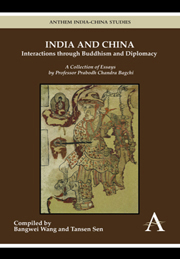 India and China: Interactions through Buddhism and Diplomacy
India and China: Interactions through Buddhism and Diplomacy Indian Hindu Culture and Religion in China
from Part Three - Articles in Bengali
Published online by Cambridge University Press: 05 March 2012
Summary
It was primarily through Buddhism that the Indian culture took its stronghold in China. This is the reason why in the history of Sino-Indian cultural relations, Hinduism occupies a negligible position. Most of the Indian scholars who went to China between the second century and the eleventh century of the Christian era were Buddhists. There is indeed mention of very few Hindu scholars who, in spite of being Hindus, worked extensively for the Chinese renderings of Sanskrit Buddhist scriptures as interpreters.
Nevertheless along with the dissemination of Buddhism among the Chinese people, an impact of Indian knowledge of science, astrology and medicine on them can be traced clearly. People were drawn to the study of Indian medicine enshrined in the Atharvaveda and Indian astrology. A few translations of the treatise on Indian medicine by the Chinese support this conjecture. Apart from these translations, it is interesting to note that there are references to Indian medicinal herbs in Chinese pharmacological books. There was a strong belief among the Chinese emperors that the Indian doctors knew about certain medicines which could enhance longevity of their apparently short mortal life. It was quite often that the Chinese emperors, with the hope to live longer, used to send their officials to India in search of Indian doctors.
- Type
- Chapter
- Information
- India and China: Interactions through Buddhism and DiplomacyA Collection of Essays by Professor Prabodh Chandra Bagchi, pp. 213 - 216Publisher: Anthem PressPrint publication year: 2011


